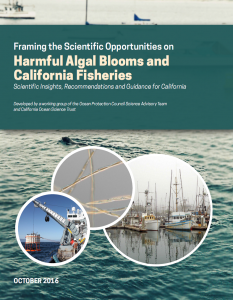A newly released report from the California Ocean Science Trust highlights efforts to learn from the 2015 massive bloom of the toxin-producing marine diatom Pseudo-nitzschia that formed off the U.S. West Coast. The harmful algal bloom (HAB) impacted key fisheries, such as Dungeness crabs and razor clams, and marine mammals from California to Alaska. NOAA supported a large HAB event response.

The California Ocean Science Trust led a working group to explore HABtoxins in the marine environment, and their impact to fisheries along the coast of California. Credit: California Ocean Science Trust
This past summer, California convened a workshop to learn what caused the HAB event, understand environmental and economic impacts, and improve preparation and response techniques. The result is the newly released report titled, Framing the Science Around Harmful Algal Blooms and California Fisheries: Scientific Insights, Recommendations and Guidance for California. NCCOS sponsored research partners facilitated the effort. The report highlights accomplishments (C-HARM and CalHABMAP) derived in part from NCCOS ECOHAB and MERHAB projects in California (e.g., ECOHAB CA HAB Hotspots, MERHAB RAPDALERT, MERHAB Cal-PReEMPT) and summarizes current state of HAB knowledge and how it can be used to mitigate bloom impacts.
It concludes by recommending that state-wide HAB monitoring capacity be expanded and improved, better understanding of offshore bloom dynamics and bloom timelines be pursued, and predictive modeling tools be developed and linked to monitoring and management.
The report will directly benefit California agencies as they work to mitigate future HABs impacts and identify HAB research and management priorities to inform federal and state agencies along the U.S. West Coast.
For more information, contact Marc Suddleson and Quay Dortch.
 Official websites use .gov
A .gov website belongs to an official government organization in the United States.
Official websites use .gov
A .gov website belongs to an official government organization in the United States. Secure .gov websites use HTTPS
A lock or https:// means you’ve safely connected to the .gov website. Share sensitive information only on official, secure websites.
Secure .gov websites use HTTPS
A lock or https:// means you’ve safely connected to the .gov website. Share sensitive information only on official, secure websites.